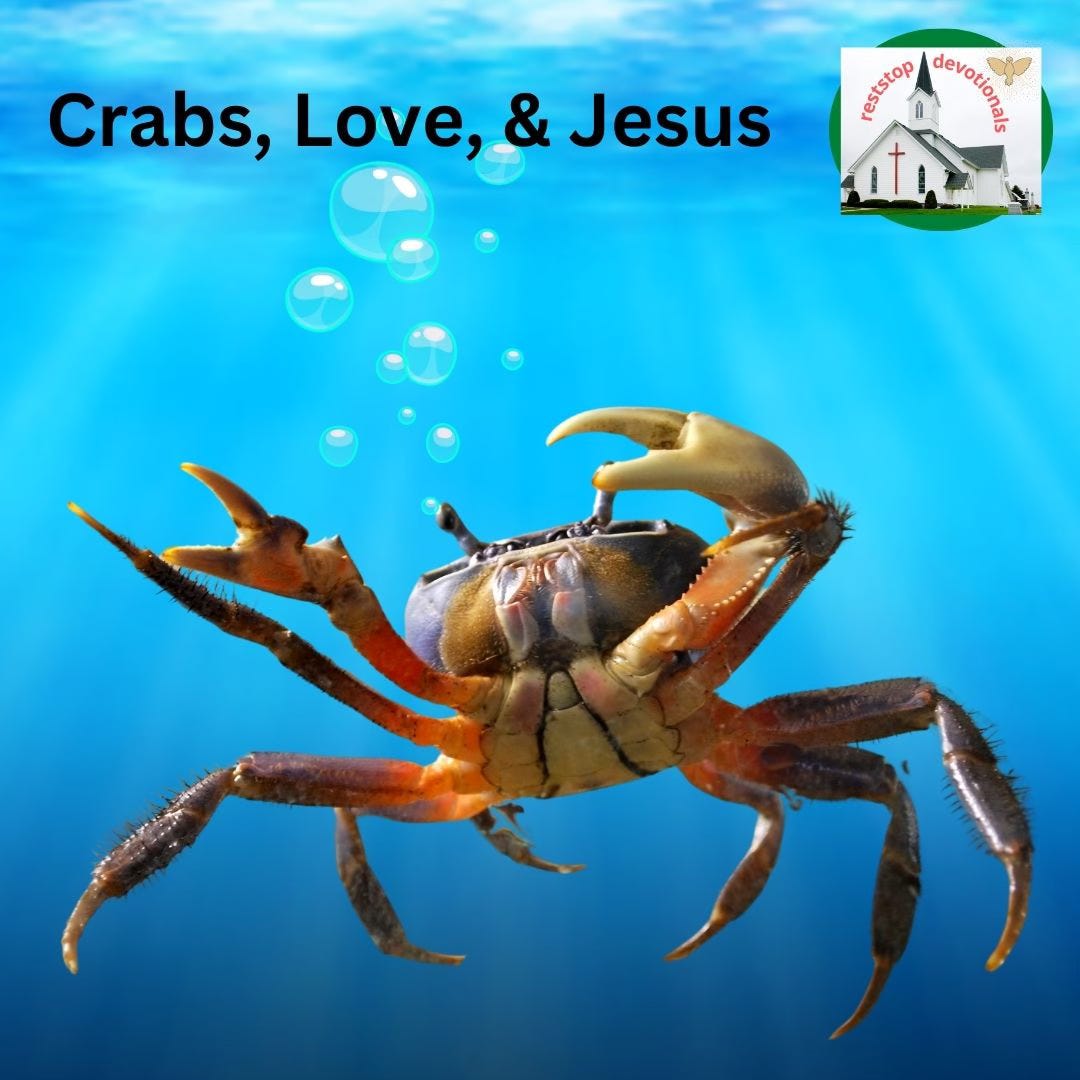When you look at a crab, there is nothing about it that says, “Eat me.” They’re a short, bristly, flat body, sea creature with a bunch of legs and big claws. Their eyes are the ugliest part of their body. Crab eyes look like tiny marbles mounted on Slinky springs. Don’t be fooled. Their eyes are powerful, even hypnotic. When a person stares into the eyes of a crab too long, they hear voices in their head.
You don’t want to eat me! How about a nice salad?
While many animals use a camouflage mechanism to evade predators, crabs use an ugly-as-sin-mechanism.
If you decide to eat crab, be prepared for a dining experience like none other. The process of cooking and eating a crab is gruesome. It starts with dropping the live crab into a pot of boiling water. When that part is over, you pull the crab corpse out of the water and pound the snot out of it with a wooden mallet. This is followed by crushing the shell with a type of portable crab vice grips. It’s basically crab Hell.
The last step is to pull some crab meat out of the pulverized exoskeleton, dip it in melted butter, and eat it. Personally, I think butter is the only reason people eat crab.
There are better and easier things to eat than crabs; things that don’t require such a violent preparation process. Take oranges, for example. Oranges are the Ms. America of fruit. They’re colorful, nutritious, and grow on trees with beautiful blossoms under sunshine and bright blue skies. When you walk through an orange orchid, you can almost hear them singing a 1960s love song. “Hold me, squeeze me, peel me, zest me.”
Don’t try that with a crab.
There are no Biblical rules against oranges. Not so with crabs. These crustaceans of uncleanliness are listed on one of the Bible’s Detestable-To-You (DTY) lists. Most of the DTY lists in the Bible are in a book called Leviticus. If crabs could read, I know Leviticus would be their favorite book in the Pentateuch. That’s because Chapter 11, Verse 12, prohibits the Israelites from eating crabs. The Israelites could only eat seafood if it had fins and scales. Can’t you picture a bunch of crabs celebrating this prohibition, knowing they’ll never end up in a Jewish Seafood fettuccini? They’re holding each other’s claws, line dancing, sideways; always sideways, because that’s how crabs dance.
There are some strange rules in the book of Leviticus. The book contains prohibitions against eating fat and certain types of birds. It tells you when you’re supposed to take your clothes off and burn them and when you should disassemble your house and carry all the pieces out of town.
There are some difficult rules in this book, including rules about animal sacrifices, sex, and blasphemies. Altogether, there are 251 rules in the book of Leviticus. That means 40% of all the rules in the Old Testament are in this one book.
You wouldn’t suspect it but the book of Leviticus contains two of the foundational tenets of the Christian faith. I am confident most people have heard of one of them.
The first one comes from Chapter 17, Verse 11.
For the life of a creature is in the blood, and I have given it to you to make atonement for yourselves on the altar,…
Life is in the blood, and blood is given for atonement. That is the central theme of the Bible. Consider these verses from the New Testament:
Matthew 26:28 – Jesus is holding the communion cup when He says, “for this is my blood of the covenant, which is poured out for many for the forgiveness of sins.”
1 John 1:7 But if we walk in the light, as he is in the light, we have fellowship with one another, and the blood of Jesus his Son cleanses us from all sin.
Ephesians 2:13 But now in Christ Jesus you who once were far off have been brought nearby the blood of Christ.
Finally, here is that verse I’m betting most people have heard of, but they may not know it originates from this book called Leviticus.
Leviticus 19:18. Love your neighbor as yourself.
Jesus said all those aforementioned strange and difficult rules are satisfied if you love your neighbor as yourself. (Matthew 22:37- 40)
I love the fact that my Christian faith focuses on seeking the greatest good of my neighbors, no matter who they are.
Blessing to all who read this, from my family to yours.
(I want to thank my #2 son, a former tax deduction of mine, for that opening line about crabs.)






I love crab and am grateful for Mark 7:18-19: "There is nothing outside the man which can defile him if it goes into him; but the things which proceed out of the man are what defiles the man." Jesus declared all food clean, but told us to mind our speech.
Thanks for your writing here. I enjoy it.